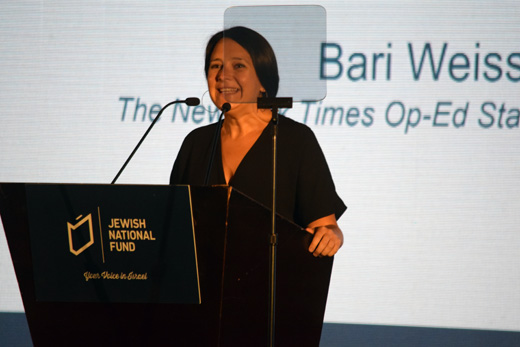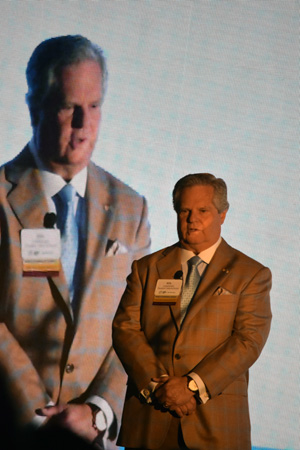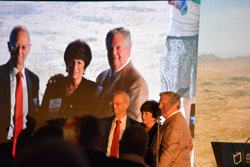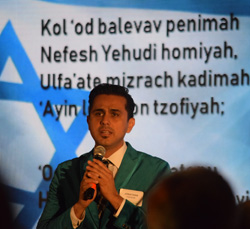
By Donald H. Harrison


SAN DIEGO – The New York Times columnist Bari Weiss on Sunday, Jan. 20, previewed for 450 supporters of the Jewish National Fund a book she is currently writing, The New Seven Dirty Words, about important yet controversial terms that often are used in discussions about Jews and Israel.
Featured as a speaker at a JNF brunch at the Hilton Bayside Hotel, Weiss listed those words as “anti-Semitism,” “the East,” “occupation,” “empathy,” “peoplehood,” “loneliness,” and “power.” Following are some thoughts she expressed about these terms, some of which she described as “topics we assiduously avoid and debates we are too cowardly to have.”
Anti-Semitism – “It is not just hate; it is a conspiracy theory, a conspiracy in which Jews play a starring role in spreading the evil of the world. While racists see themselves as proudly punching down, anti-Semites see themselves as punching up. What anti-Semitism does is that it turns the Jews– the Jew—into the symbol of whatever that civilization defines as its most hateful qualities. … Under Communism, the Jews were the ultimate capitalists. Under Nazism, the Jews were the race contaminators, and so on. This is one of the reasons that anti-Semitism is so hard to fight, because it can physically threaten us, ideologically vilify us, and politically isolate us, all at once and from different directions.” She added that the crux of the conspiracy theory is that although Jews are a tiny minority, Jews have the ability to use their wiles and their proximity to power “to con others into accomplishing their evil ends.” Israel is the “biggest Jew today” in the modern demonology of anti-Semitism, Weiss said.
The East – “We are still telling an Ashkenazi Jewish story when it comes to Israel. That is certainly the narrative that I was taught in Jewish day school [in Pittsburgh, Pennsylvania] — a story that began with the fires of Europe and ended with the establishment of the state of Israel … Where in that narrative are the Jews of Tunis and Algiers or of Mosul and the rest of the Islamic world? These are the stories of half the Jews in contemporary Israel. Their stories are essential, not just for understanding that Israel is indigenous to the region, or for making our case politically.” When people ask where Jews come from, Weiss counseled, “the answer should not be Poland or Hungary; the answer should be the Land of Israel. It’s time to embrace the Jewish place in the Middle East.”
Occupation — She said that a wise person once suggested to her that “there are two nightmares about a Palestinian state. One is that there is one and that it becomes an outpost of terrorism. The other is that there never is one and Israel indefinitely occupies another people.” Avoiding the reality of the word “occupation” is disastrous among young people, Weiss went on to say. “I cannot tell you the number of people I know who went to Jewish day school and Jewish summer camp, and arrived on campus and felt like they were lied to by every adult in their life. Keeping young Jews ignorant about the reality in the State of Israel is a recipe for disaster. There is another people that lives there. You might think that Israel’s occupation is justified; you might think that it is an existential threat, but it is a reality. To tell the story of modern Israel and to leave that out—leaving out the Palestinian claim—does a huge disservice to young Jews who are naturally on the political left.” She said “the bottom line is that we want to be educating young Jews about the David and Goliath paradox … Yes, Israel is a David in the region, but it is very much a Goliath locally. This is uncomfortable, but it is the truth…”
Empathy – Weiss said empathy is needed in the Jewish community, especially between American Jews and Israeli Jews. She said novelist Michael Chabon gave a speech at Hebrew Union College that epitomizes the lack of empathy that characterizes part of the American Jewish world. In it, Chabon talked about walls, including the one that Israel built to protect itself during the Second Intifada. He said, “Security is an invention of humanity’s jailers.” Weiss said she found it incredible that “someone so imaginative in his novels could be so unimaginative when it comes to understanding the reality of our brothers and sisters in a region that could not be more different than our own. The reality of the Middle East, by and large, is what happened to Jamal Khashoggi in that Saudi embassy. It is brutal, it is violent, and it requires an embrace of power and force that most American Jews, who have never shot a gun, cannot begin to understand.” On the other hand, Israeli Jews lack empathy when they talk about American Jewish life as “some pale ghost, and the values that we are proud of – our pluralism, our inclusiveness, our open-mindedness—are denigrated as signs of weakness.”
Peoplehood — “What are the Jews? Are we an ethnicity? Are we a religion? Are we a race? Are we a people with a particular passion for smoked salmon? The answer is all of the above! … We are a people who grew out of a tiny desert tribe. We also happen to have brought into the world some ideas that changed the course of history — One God, human dignity, the sanctity of life, freedom” — ideas that she noted are still yearned for in many parts of the world today. “How many Jews today know that is our legacy? How many Jews understand themselves as a link of that miraculous chain?” She said we should not think of ourselves primarily as Reform, Conservative or Orthodox, but instead as klal Yisrael Jews.
Loneliness – “You don’t need to believe in the literal truth of the [biblical patriarch] Abraham’s story to be struck by two very deep lessons that it offers. The first is the refusal to worship false idols and the second is the courage to be out of step with those around you.” Jews in America today are a lot like Abraham, she said. “We are politically homeless. We are nomadic. We are left out of the Left which tells us that we need to check our Zionism and our particularism at the door of progressive spaces.” Meanwhile the Right is suspicious of Jews, she said, because of “our commitment to universal ideals, to liberalism … to welcoming the stranger and the refugee.” Weiss said Jews “need to be courageous enough to stand apart, not to bend to the crowd and not to give in to group think.”
Power – “We [Jews] have political and military power in Israel. We have social, financial, and political power at home.” The point of all this power is not just to be on the side of people who have power, Weiss said. “It is to learn how to use our power, how to use our influence.”
Prior to Weiss’s lecture, Dr. Sol Lizerbram, a Rancho Santa Fe resident who is national president of the Jewish National Fund, announced that the JNF thus far had raised $572 million of its $1 billion fundraising goal. The money will be used to continue such programs as providing fire fighting equipment for the Israeli communities near Gaza; providing tours of Israel for 100 American professors annually to teach them “the real story behind the BDS movement;” offering programs on 135 North American campuses; creating a river and lake complex in Be’er Sheva that will provide recreation for residents and tourists; developing in Be’er Sheva an education and

technology campus that will be three times the size of New York’s Central Park to supplement the Alexander Muss High School campus in Hod HaSharon and to work in concert with major technology firms with satellites in Be’er Sheva including Oracle, IBM, and Dell; creating medical centers for underserved communities in the Negev and the Galilee, building 90 new reservoirs in addition to the 250 reservoirs already built by JNF, and creating a culinary center in the Galilee.
In connection with the development of a medical center near the intersection of the borders of Israel, Gaza, and Egypt, and with the donation of a fire truck to that area, Lizerbram made a special presentation to local honorees Dr. Robert and Karen Zeiger for their philanthropy.

In other highlights in the ballroom, which was draped at either end with huge portraits of Theodor Herzl and David Ben-Gurion, Jonathan Valverde, president of Latinos for Israel, sang stirring renditions of Hatikvah and the Star Spangled Banner; Myra Check Fleisher, national president of Women for Israel (a JNF affiliate), announced that “kosher queen” Jamie Geller will be in San Diego County on May 19th for an organizational tea, and JNF CEO Russell Robinson, in a video appearance, provided two historical tidbits about Zionism. First, he said, when Theodor Herzl hosted the first Zionist Conference in Basel, Switzerland, he required delegates to wear tuxedos, or at least suits, so as to give a good impression about Zionists. He personally paid for renting tuxedoes for those delegates who could not afford to do so. Second, before Ben-Gurion announced Israel’s independence, the final draft of his speech was typed at JNF headquarters in Tel Aviv.
*
Harrison is editor of San Diego Jewish World. He may be contacted via donald.harrison@sdjewishworld.com
Thank yous to Sara Katz, Karen and Bob Zeiger, and Shari Schenk. I very much appreciate the positive feedback.
Don Harrison
Don, thank you so much for the wonderful article and great summary of Bari Weiss’ speech. Many people asked if they could get a copy of her speech–I told them all to read your excellent article. You did a great job recapping the event. Thank you for all you do for JNF and for our community!
Thanks for letting the Jewish community learn about The Love of Israel Brunch on Sunday.
Best regards,
Karen and Bob Zeiger
Sara Katz wrote:
Don, I really appreciate this story. As we were walking out to the car, we were trying to recite the seven words that she stressed in her speech. As someone who has spent their life working on key messages, I was struggling for the basic takeaways… The elevator speech. Being able to read this a couple more times enabled me to get my arms around her messaging a little bit more. Thanks again.